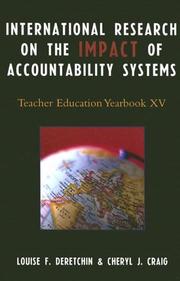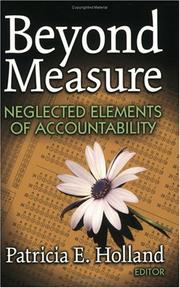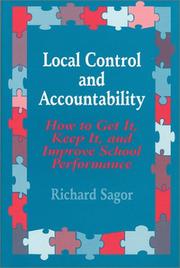| Listing 1 - 10 of 405 | << page >> |
Sort by
|

ISBN: 1578865468 1578865476 9781578865468 9781578865475 Year: 2007 Publisher: Lanham, Md. Rowman & Littlefield Education; published in partnership with the Assocation of Teacher Educators
Abstract | Keywords | Export | Availability | Bookmark
 Loading...
Loading...Choose an application
- Reference Manager
- EndNote
- RefWorks (Direct export to RefWorks)

ISBN: 113843566X 1317922271 1315853639 131792228X 9781317922278 1299869629 9781299869622 1930556802 9781930556805 9781315853635 9781317922261 9781138435667 Year: 2017 Publisher: [Place of publication not identified], ROUTLEDGE,
Abstract | Keywords | Export | Availability | Bookmark
 Loading...
Loading...Choose an application
- Reference Manager
- EndNote
- RefWorks (Direct export to RefWorks)
This book shows that the current focus on high stakes tests has narrowed the definition of a successful school. It demonstrates that, in addition to focusing on standardized measures, educators also need to look at other matters, such as what actually goes on in their classrooms, teachers' professional development, parental involvement, and school climate. These chapters were written by school leaders who are champions of accountability, but who also ask us to take a look at the "bigger picture".
Book
ISBN: 9264836063 Year: 2022 Publisher: Paris : OECD Publishing,
Abstract | Keywords | Export | Availability | Bookmark
 Loading...
Loading...Choose an application
- Reference Manager
- EndNote
- RefWorks (Direct export to RefWorks)
High-quality education that translates into better and more relevant skills pays off for individuals, communities and societies in significant and diverse ways. It leads to higher earnings, increased productivity, innovation and sustained economic growth. Beyond these economic outcomes, high-quality education also generates a wide range of social returns. Better-educated individuals live longer and healthier lives. They become more engaged citizens and are more likely to take action for collective well-being. Sustained high-quality education supports communities in proactively addressing emerging challenges, such as climate change but also making the most of new opportunities, such as the digital transformation. This chapter provides an overview of the broader social outcomes of education. Such returns span a continuum, from private benefits (e.g. better health, better opportunities for ones children) to societal ones, as private benefits translate into positive externalities and collective benefits. The social outcomes of education can thus be considered as an outcome in themselves or as a crucial channel towards better economic outcomes.
Book
ISBN: 0884050653 Year: 1974 Publisher: New York : Petrocelli Books,
Abstract | Keywords | Export | Availability | Bookmark
 Loading...
Loading...Choose an application
- Reference Manager
- EndNote
- RefWorks (Direct export to RefWorks)
Book
ISBN: 9087909020 Year: 2009 Publisher: Leiden : Brill,
Abstract | Keywords | Export | Availability | Bookmark
 Loading...
Loading...Choose an application
- Reference Manager
- EndNote
- RefWorks (Direct export to RefWorks)
In an age when responses to accountability regimes in education range from hysteria to cynicism, this volume reframes accountability in narratives of collective, participatory responsibility that leave one feeling inspired and ready to act. The authors, all scholar-practitioners speaking from contexts spanning leadership, policy, literacy, indigenous education, and diversity, explore ways to navigate accountability discourses with wisdom, courage and hope.—Tara Fenwick, PhD, Head, Dept. of Educational Studies, University of British Columbia. In this collection, the preoccupation of educational institutions with accountability is critically examined by writers who work in the field. They consider the impact of accountability regimes on professional practice and the learning agenda, challenge current policies and call for a rethinking of accountability. The skills and knowledge associated with this work is what we should hold schools accountable to. It is, as you see from reading these contributions, time for change.—Stephen Murgatroyd, PhD, Chief Scout, The Innovation Expedition Inc. About the Book From their diverse perspectives, nine educational practitioners discuss current educational accountability policies and how these affect students, educators, learning and teaching in a variety of settings, from K-12 schools to post-secondary institutions and government agencies. The authors combine theory, research and their day-to-day experiences to reflect on the challenges posed by realities such as outcomes-based curricula, high-stakes testing, standardized reporting and management by objectives. By examining current accountability initiatives and their effects in relation to core values of public education such as equity, diversity, democracy and opportunity, this book offers educators a range of insights for thinking about and doing education differently.
Book
ISBN: 0821122509 Year: 1972 Publisher: Berkeley MacCutchan
Abstract | Keywords | Export | Availability | Bookmark
 Loading...
Loading...Choose an application
- Reference Manager
- EndNote
- RefWorks (Direct export to RefWorks)
Book
ISBN: 1788976134 Year: 2019 Publisher: Northampton, MA : Edward Elgar Pub.,
Abstract | Keywords | Export | Availability | Bookmark
 Loading...
Loading...Choose an application
- Reference Manager
- EndNote
- RefWorks (Direct export to RefWorks)
Since the onset of the UK's Research Excellence Framework in 2014, the environment for academic research has changed dramatically. Competitive Accountability in Academic Life goes behind the scenes of the 'impact' policy agenda for higher education research and interrogates the effects of the new framework on academic research. Richard Watermeyer dissects how a new requirement to evidence the economic and societal impact of research has created a culture of intense competitiveness in UK universities. Through the eyes of both those responsible for the REF and those working under its gaze, the author locates the gross deceit spawned from a culture of competitive accountability in UK universities. This challenging book reconceptualises the public role of researchers, posing a new effort to progress the neoliberal malaise by signposting peripheral zones of participation - and non-participation - as viable intellectual alternatives to the university. Both groundbreaking and provocative, Watermeyer's book is critical reading for academics working not just in the UK, but also internationally. The author's crucial insight into modern higher education will also prove indispensable to higher education policy makers looking to innovate and refine education policy, and to university administrators overseeing performance management systems.

ISBN: 0803964110 Year: 1996 Publisher: Newbury Park Corwin
Abstract | Keywords | Export | Availability | Bookmark
 Loading...
Loading...Choose an application
- Reference Manager
- EndNote
- RefWorks (Direct export to RefWorks)
Book
Year: 2008 Publisher: [Washington, D.C.] : U.S. Govt. Accountability Office,
Abstract | Keywords | Export | Availability | Bookmark
 Loading...
Loading...Choose an application
- Reference Manager
- EndNote
- RefWorks (Direct export to RefWorks)
Book
ISBN: 1598753657 Year: 2004 Publisher: Santa Monica : RAND Corporation,
Abstract | Keywords | Export | Availability | Bookmark
 Loading...
Loading...Choose an application
- Reference Manager
- EndNote
- RefWorks (Direct export to RefWorks)
Little has been written about the interaction of the No Child Left Behind Act with external audiences that have no formal connections with the schools. This study focuses on print journalists and foundation program officers, who frequently use data from schools and districts in their work.
| Listing 1 - 10 of 405 | << page >> |
Sort by
|

 Search
Search Feedback
Feedback About UniCat
About UniCat  Help
Help News
News